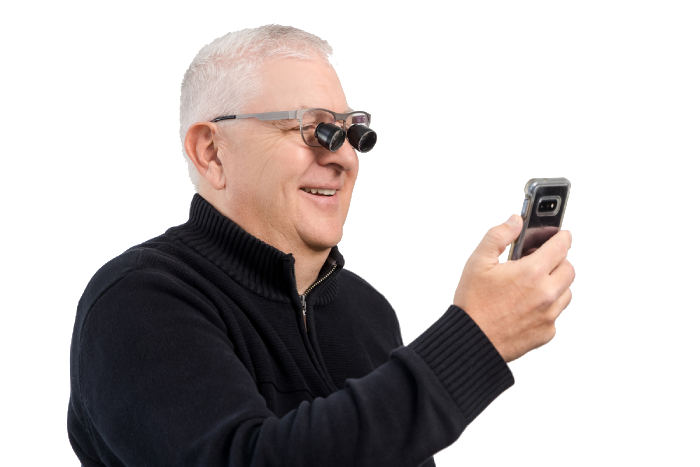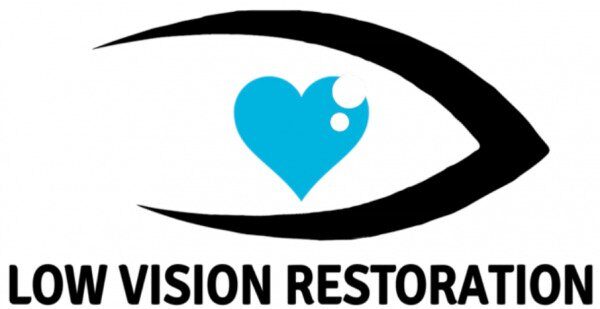Do Again
There is Life After
Vision Loss.
- Macular Degeneration
- Ocular Albinism
- Stargardt Disease
- Glaucoma
- Diabetic Retinopathy
- Retinitis Pigmentosa
- Rod Cone Dystrophy

Frequently Asked Questions
Ever since William Feinbloom O.D., PH.D. introduced the first low vision glasses in 1936, there have been low vision solutions that, for whatever reason, are not widely known to the general public (unlike hearing aids.) People with vision-limiting conditions are often frustrated because they have been told that there is nothing more that can be done for their vision when, in fact, there often is!
While there are many ways low vision can be defined or described, the practical meaning is: Low Vision is vision that is not good enough to do what you want to do, and is not correctable with normal glasses or surgery.
Some conditions are genetic. Other causes can be congenital or traumatic.
Low Vision Doctors are more concerned with the amount of remaining vision, not the cause of the loss itself.
A low vision examination is quite different from a regular eye examination. It is a longer examination usually lasting one hour or more. It is a “vision and function” examination; therefore medical tests such as dilation are usually omitted. The first part of the low vision examination is conversing with the patient to find out how the reduced vision is affecting their life. The “wish list” is created so the doctor understands what the patients’ goals are. The second part is extensive vision testing. Careful refraction is performed to find out if a new “regular” eyeglass prescription will help. Part three works with magnification, illumination and other optical and non-optical low vision devices. The doctor must determine the best form and level of magnification needed for the person to perform the desired tasks. Telescopes, microscopes, and prisms, with varying levels of magnification and strength as well as other magnification devices are presented to the patient. Illumination levels must be determined as lighting plays a major role in vision. Part four is another conversation with the patient to determine the best form and level of magnification for that particular person’s task requirements.
Low Vision doctors have been trained in the physics, optics and use of high powered lenses and lens systems. They understand the principles of magnification, field of view, depth and of focus. They also have a working knowledge of the advantages and disadvantages of the multitude of low vision glasses, magnifiers, electronic and non-optical devices available. A low vision eye doctor understands how to work with patients and families who can be extremely upset, fearful, and even depressed. It’s a doctor who has the patience and time to explain the eye and vision condition and what the future may hold for patients who may be confused, misinformed and/or have an unrealistic view of their future. A low vision eye doctor has compassion and empathy for what the patient and family is going through as well as the knowledge, resources and experience to help them adjust to the difficult situation. Low Vision doctors know how to analyze a task according to the amount of vision, lighting, working distance and field of view needed for completion. They are expert as designing low vision glasses to meet the needs of the patient.
It usually takes two to four weeks for specialized glasses to be fabricated. Arrangements can be made to have them sooner in some circumstances. If a person has a special event happening and needs the glasses, the lab can usually expedite the order.
THE NATIONAL INSTITUTES OF HEALTH have demonstrated with two scientific studies (AREDS I & II) that nutritional supplements can slow down, stop or even prevent age related macular degeneration. Numerous other studies, including the Lutein Antioxidant Supplementation trial (LAST), have demonstrated visual improvement in patients taking specific high-dose supplements that include lutein, zeaxanthin and omega 3 fatty acids from fish oil.
The free telephone consultation is a way of limiting the time, expense, and disappointment of people who probably cannot be helped by low vision care. Dr. Palmer has determined that asking the right questions on the phone could determine if a patient was qualified for low vision services. “If not, why put the patient through the time and expense only to be extremely disappointed?” says Dr. Palmer. During the free telephone interview, the doctor will ask questions regarding vision, functional abilities, goals, motivation, health, and mobility to determine if an appointment is in the best interests of the caller.
During the evaluation, the patient will use actual low vision telescope, microscope and prismatic glasses on the tasks desired. The doctor and the patient will see that they work BEFORE they are ordered. This will be done again when the patient picks up the glasses. We never order glasses until the patient knows that they work.
Almost always, prescriptions and magnification levels can be changed without the need for a whole new pair of glasses. We offer a twelve month warranty if the prescription changes at no charge to the patient. It is interesting that changes are actually rarely needed.
We accept cash, personal check and all major credit cards. In addition, we offer no-interest and low interest financing.
Macular Degeneration
Stargardt Disease
Glaucoma
Ocular Albinism
Retinitis Pigmentosa
Diabetic Retinopathy
Stroke-Hemianopsia
Rod Cone Dystrophy
This is not an exhaustive list and there does need to be some usable vision to work with.
An office visit with Dr. Palmer starts with evaluating your vision and the tasks you want to do with better vision. With this information, Dr. Palmer can design and demonstrate specialized magnifying devices.
- The appointment does not typically involve eye drops
- Dr. Palmer may use a specialized eye chart to more fully evaluate your vision
- It will be requested that you bring examples of the unique activities that you want to perform (read mail, see your laptop and phone screens, do crafts/hobbies, etc.)
- Dr. Palmer will prescribe customized glasses specific to your vision and what you want to do
The International Academy of Low Vision Specialists has a doctor directory on their website. People do not need a doctor referral to make an appointment. www.IALVS.com


